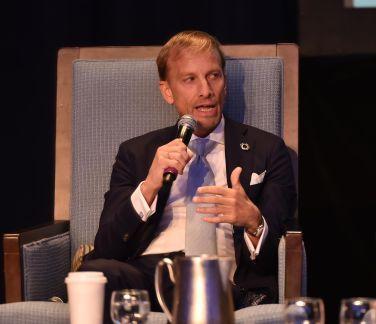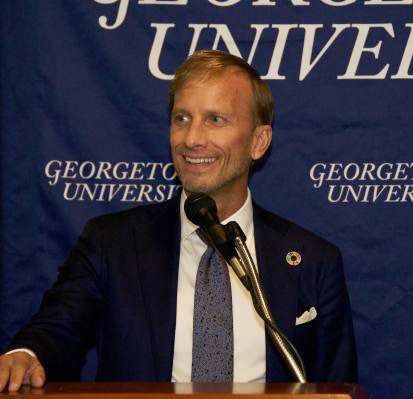As Director of New Global Health Center, Dybul Comes Home to Georgetown

Posted in GUMC Stories
September 8, 2017–In the 1980s while working for Rev. Timothy Healy, S.J., then-president of Georgetown University, Mark Dybul, MD, (C’85, M’92) was struck by Healy’s passion for the university’s role in the world.
“Healy believed that the university is not a tucked away place where you hide,” Dybul said. “It is not spirit behind walls. It is spirit in the world and the notion that a university creates and educates people, not just intellectually but as human beings who will enter the world and participate in the world with those values of social justice and service.”
That vision of the university was part of Dybul’s inspiration for returning to Georgetown this July after serving as executive director of the Global Fund to Fight AIDS, Tuberculosis and Malaria and US global AIDS coordinator responsible for implementing the President’s Emergency Plan for AIDS Relief (PEPFAR), which he also helped develop.
As the inaugural faculty co-director with Charles B. Holmes, MD, MPH, of the new Center for Global Health and Quality (GHQ) , Dybul will work with top philanthropic, NGO and governmental partners around the world to respond to new and emerging global health challenges and scale up quality services while maximizing resources.
“There is perhaps no one better to advance the work of GHQ than Mark Dybul, who has served the global community, and our Georgetown community, with extraordinary distinction for many years,” said John J. DeGioia, Georgetown University president. “We are grateful to welcome him back to the Hilltop and we look forward to all he will accomplish in the time ahead.”
“We are excited about the new energy, experience and leadership Dybul brings to Georgetown,” said Edward B. Healton, MD, MPH, executive vice president for health sciences and executive dean of Georgetown University School of Medicine. “A key leader in global health, Mark joins a strong and dedicated cohort of Georgetown faculty members who have devoted their careers to global health.”
An Unlikely Path
Embarking on a career in medicine was not something Dybul planned. As an undergraduate at Georgetown, he was interested in studying philosophy, theology and English when he read a magazine article about the global AIDS epidemic. “That’s something that grabbed a hold of me that I was never able to get out of my system,” Dybul said. “I just decided I needed to deal with that so I ended up switching my focus and going to medical school.”
Dybul never before felt interested in science but was drawn to medical research in AIDS because of the great need. “At the time, general medicine was just watching people die,” he said. “Going into research was the only other path.”
After earning his medical degree at Georgetown and completing a residency in Chicago, Dybul worked at the National Institute of Allergy and Infectious Diseases as a research

fellow under its director, Anthony Fauci, MD, conducting basic and clinical studies on HIV, including the first randomized, controlled trial with combination antiretroviral therapy in Africa. He then served as the Department of Health and Human Services lead for P
resident Bush’s International Prevention of Mother and Child HIV Initiative.
In 2006, Dybul was named US Global AIDS Coordinator under President George W. Bush and was responsible for leading the PEPFAR as its chief architect. He served until early 2009 when he returned to Georgetown to serve as co-director of the Global Health Law Program at the O’Neill Institute for National and Global Health Law. Dybul left Georgetown in 2013 to serve as executive director of the Global Fund, a position he held until May 31.
“Partnerships Rather Than Paternalism”
Increasingly, the field of global health is shifting from a top-down approach where donors and experts dictate the terms of programs to implementing countries to a model where all of the relevant parties work together, Dybul said.
“PEPFAR and the Global Fund have played critical roles in this shift, from supportingnational scale-ups of programs, partnerships rather than paternalism, shared responsibility and accountability at the country level, and building up technical expertise in countries,” Dybul said.
Some universities have developed expertise at implementing global health programs but the GHQ is different, Dybul explained. “We are more interested in supporting people in the country to provide the services and establish the systems so that that external support is no longer necessary,” he said.
Those living in countries where global health programs are being implemented shouldn’t be forced to rely on outsiders, Dybul said. “It should be that we are linked as human beings supporting each other and supporting their ability to build the systems and provide the highest quality services in the environment they are in,” he said. “So our goal is to support individuals in country and help them create systems so that they can have their highest quality health care.”
Georgetown’s Role: Promoting Social Justice and Service
Social justice and service are the foundation of global health and development, Dybul said, and by training students to live those values, Georgetown is in a unique position to make a significant contribution to the field.
“I think the university has a role in expanding people’s vision beyond the gates of a university and beyond strictly academic and intellectual pursuits to that spirit in the world and how you can participate in the world, whether it is global health development or any other human interaction,” he said.
The university also has the ability to show students that there are many ways to get involved with global health without working in medicine or development.
“There are many ways to participate in global health,” Dybul said. “You can participate in global health by going and working in a clinic. You can participate in administration. You can participate by contributing financially or just being interested. You can participate by letting your members of Congress know that this is something you care about.”
“A profession does not determine whether you do social justice or service,” he said. “It is how you behave day-to-day, moment-by-moment.”
“A Moral Obligation”
Part of Georgetown’s Global Health Initiative, the GHQ is a multi-disciplinary, cross-campus enterprise that will bring together leaders in the fields of global health, health care, big data, service delivery, economics, program design, international relations, law, management and more.
With Georgetown’s expertise in big data, the GHQ will focus on developing and promoting data-driven decision-making, to maximize efficiency and cost savings. “With the massive power that the university has in data, we think that can contribute enormously by linking the

use of data for decision-making to policymaking, from a community health care worker to a regional manager to a minister of health to a global organization and back again in a feedback loop,” Dybul said. “Building that link from data to decision-making to feedback to higher quality programs is how we will achieve maximum healthcare for the lowest cost.”
Ultimately Dybul believes there is a moral obligation to spend wisely the limited resources devoted to global health. “Lots of money is spent,” he said. “We do not spend it as efficiently as we can. From a social justice perspective, if you can use resources and get healthier people, you have a moral obligation to do so.”
Developing a New Vision
The biggest problem in the field of global health currently is the absence of an overriding vision, Dybul said. “Global health was a manifestation of the notion that we are in this together, we will serve each other, and we will change the world for the better,” he said. “Losing that vision is the greatest risk to global health.”
While the accelerating pace of social change worldwide is creating anxiety, universities like Georgetown are obligated to continue challenging people to look outwardly, Dybul said. “It is the purpose of the university, again, to get us out of walls, to open ideas, to look forward, to look with hope,” he said. “It is only when we look outward with hope and towards others when we look beyond walls that we can actually change things.”
Despite those challenges, Dybul is hopeful that such positive change is on the horizon. “I feel optimistic that we can actually end HIV, TB and malaria, that we can create social justice and health equality, and create a more perfect world,” he said. “We have the people to do it. It’s just about doing it.”
“We need to be ambitious,” Dybul said. “We need to be incredibly optimistic. But we also need to look at step-by-step. That doesn’t mean limiting our ambition because we are not sure it can be done. It means expanding our vision by understanding how to get it done.”
Kat Zambon
GUMC Communications
